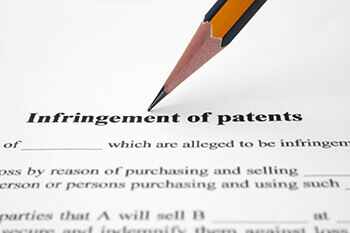Intellectual Property Law
What is an ITC Proceeding?
The U.S. International Trade Commission (“ITC”) is a federal agency that oversees actions against unfair trade practices, such as patent, trademark, and copyright infringement. The ITC handles IP cases involving imported goods under Section 337 of the Tariff Act of 1930. Ninety percent of Section 337 cases involve patent infringement disputes. Section 337 cases are a useful tool because they can keep imported goods out of the U.S. market or preserve an importer’s continued access to U.S. consumers.
The Proceeding: An ITC action is initiated by filing a complaint. The Commission decides whether it will institute an investigation within 30 days after filing the complaint. If an investigation is instituted, the Commission then refers the investigation to an Administrative Law Judge (“ALJ”) who sets the ground rules and discovery schedule for the investigation, as well as a date for the hearing, initial determination, and the final determination. The hearing takes place approximately three months before the initial determination. The ALJ then issues its initial determination, which the Commission may review at its discretion. Finally, the Commission issues its final determination and this determination stands unless the President disapproves it.
Remedies: The remedies the Commission is authorized to grant include the following:
- limited exclusion orders (against parties);
- temporary limited exclusion orders (during the investigation and the Presidential review period);
- general exclusion orders (against any person, even non-parties);
- cease and desist orders; and
- temporary cease and desist orders.
Differences Between an ITC proceeding and litigation:
The key distinctions between an infringement action in the ITC and an action in federal district court are that the ITC may not award damages, and the time frame for ITC proceedings is more expeditious than in many district courts. Another difference between an ITC proceeding and a federal court proceeding is that the filing of a complaint with the ITC does not guarantee that an investigation will occur. The ITC has discretion to determine whether an investigation should take place, and, if it does so, the ITC itself conducts the investigation, with its staff attorneys acting as an independent party in the proceeding.
Litigating in the ITC presents a unique challenge – there is a short period of time to litigate a technologically complicated case which can make or break the commercial success of the products at issue. Not only do Section 337 cases require a command of IP law, they also require the scientific or technical background needed to efficiently evaluate the key technological and legal issues that will drive the case, as well as a thorough understanding of the patent prosecution process that produced the patent(s) at issue.

Catherine Rajwani
Principal Attorney
PHONE: 508-393-9244
EMAIL: crajwani@harborlaw.com
Catherine Rajwani is an intellectual property and business litigation attorney.
Ms. Rajwani handles a full range of intellectual property and business issues in her practice including patent, trademark, copyright, trade secret, contract and business tort disputes. She has participated in all phases of litigation, from pre-litigation counseling through trial and appeal, in federal courts throughout the country. She is also skilled in alternative dispute resolution proceedings.
Find out more about issues in our related practice areas
Intellectual Property Law
Trademark Protection
Trade Secrets
Copyrights
Patents
Intellectual Property Law
Insights, opinions and decisions you should know about

Defend Trade Secrets Act: Two Years Later
It has been more than two years since President Obama signed the Defend Trade Secrets Act (DTSA) into law, which created a federal, private, civil cause of action for trade-secret misappropriation in which “[a]n owner of a trade secret that is misappropriated may...

Where Do You Sue for Patent Infringement? – Proper Venue Post ‘TC Heartland’
In May of 2017, the Supreme Court unanimously reversed the Federal Circuit’s 25-year-old precedent on venue for corporate defendants.[1] Venue is the proper or most convenient location for trial of a case, and is governed by state and federal statutes. The 10-page...

Cost-Effective Mechanisms for Enforcing Intellectual Property Rights
In my practice, I counsel small and midsize business clients, many of which are astute with regard to securing their intellectual property rights. They have federally registered their trademarks with the U.S. Patent and Trademark Office, secured a portfolio of patents...

How Do I Defend a Patent Lawsuit?
The Top 5 Ways to Defend Your Company in Patent Infringement Litigation You discover that your company has been sued for patent infringement. After reviewing the patent cited in the complaint, you determine that the technology described relates to your company’s...
Get in touch with us.
Learn more about how we can help.